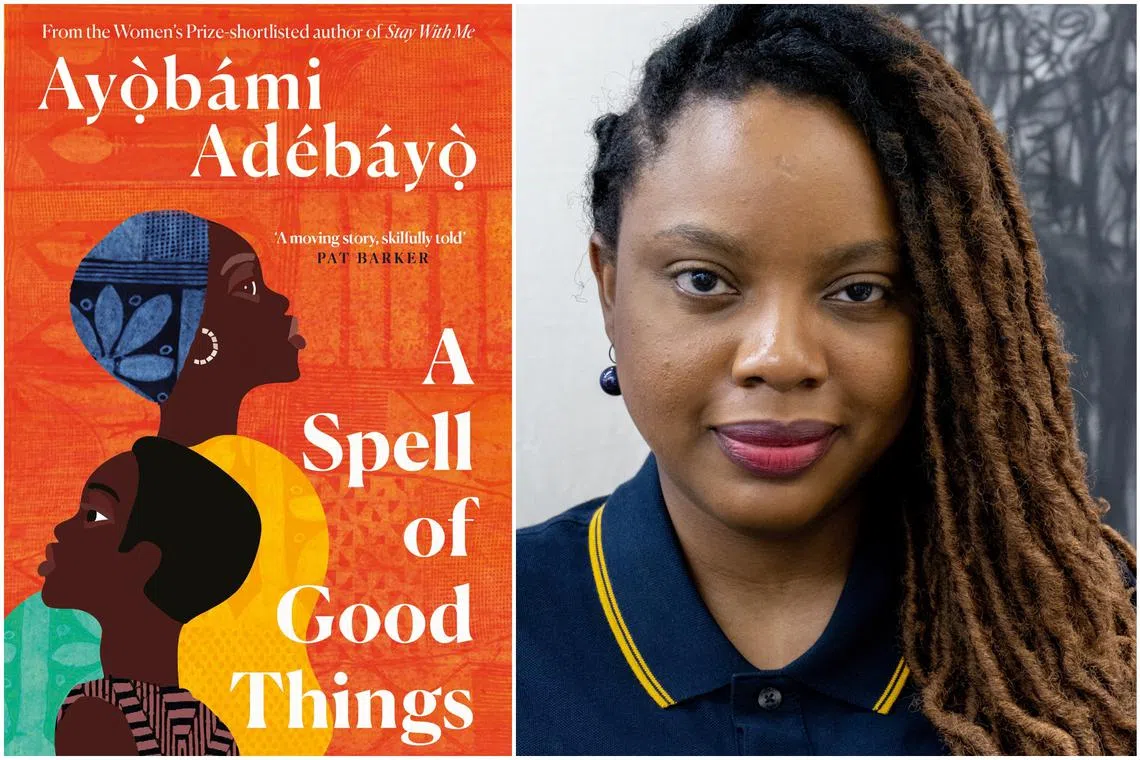Book review: A Spell Of Good Things is a slow burn with an abrupt ending
Sign up now: Get ST's newsletters delivered to your inbox

A Spell Of Good Things is the sophomore novel of Nigeria-born author Ayobami Adebayo.
PHOTOS: CANONGATE BOOKS, EMMANUEL IDUMA
Follow topic:
A Spell Of Good Things
By Ayobami Adebayo amzn.to/3NZ90ov
Fiction/Knopf/Hardcover/352 pages/$24.44/Amazon SG (
3 stars
Set in modern Nigeria, this novel follows Eniola, a teenage boy from a poverty-stricken family struggling to continue his education, and Wuraola, the “perfect” doctor daughter of a wealthy family.
Switching between them, the novel is occasionally broken up by perspectives from secondary characters, such as Eniola’s younger sister, his mother and Wuraola’s father.
Nigerian author Ayobami Adebayo takes readers into the most personal and honest moments of her characters’ lives, highlighting the divide between the wealthy and the impoverished.
Through this, she paints a realistic picture of scarcities that remain despite the country’s advancement.
Born in Lagos, Nigeria, she splits her time between there and Norwich, England, with her husband Emmanuel Iduma, who is also a writer.
Adebayo is adept at conveying the innermost thoughts and feelings of her characters, whose motivations remain murky to one another.
But the West African language of Yoruba, sprinkled liberally into dialogue with little context or translation, keeps the reader at a distance, often unable to fully understand conversations between characters.
Adebayo sketches vividly the nuances of class distinctions. Eniola worries about being bullied by his classmate after a newspaper vendor spits on him for being unable to afford the paper.
“Paul might say the wetness was there because Eniola drooled in his sleep, had not taken a bath before putting on his school uniform, came from a family that could not even afford soap. There would be laughter.”
Eniola’s struggles are heartbreaking as he faces the distinct possibility of having to drop out of school.
Wuraola’s problems, in contrast, feel almost trivial as she complains about family pressures to marry Kunle Coker, her boyfriend whom she claims to love but has no chemistry with.
The stakes in her story rise when Kunle begins hitting her, behaviour he adopted from his father, who has abused his mother for decades, though no one seems to realise it.
Wuraola’s father Otunba recalls: “When the Cokers had just moved into town, Cordelia was in and out of the hospital almost every month. If she didn’t have a fall, it was some home accident. Then there were those allergic reactions she had so often. They left sections of her face swollen for days or weeks. It had bothered Otunba for a while, and he pressed his friend to make sure there was no mould in the house they lived in at the time. As the years passed, though, he came to accept this as part of Cordelia’s constitution.”
A slow-burning narrative, events do not pick up until after the halfway mark, particularly for Eniola.
There are more than 200 pages of build-up before a tragic ending that feels unsatisfying and abrupt, despite plot and character connections privy only to the reader that result in Eniola and Wuraola losing loved ones.
What begins as a promising story of attempts to overcome hardships ultimately ends with the implication that efforts towards change are met only with loss and heartbreak.
If you like this, read: The Girl With The Louding Voice by Abi Dare (Dutton, 2020, $18.73, Amazon SG, go to amzn.to/3JFXYBQ), which follows Adunni, a young Nigerian girl from a rural village as she strives for an education. First sold as a third wife to an old man and later as a servant to a rich family, Adunni is determined to find an outlet for her voice.
This article contains affiliate links. If you buy through these links, we may earn a small commission.


